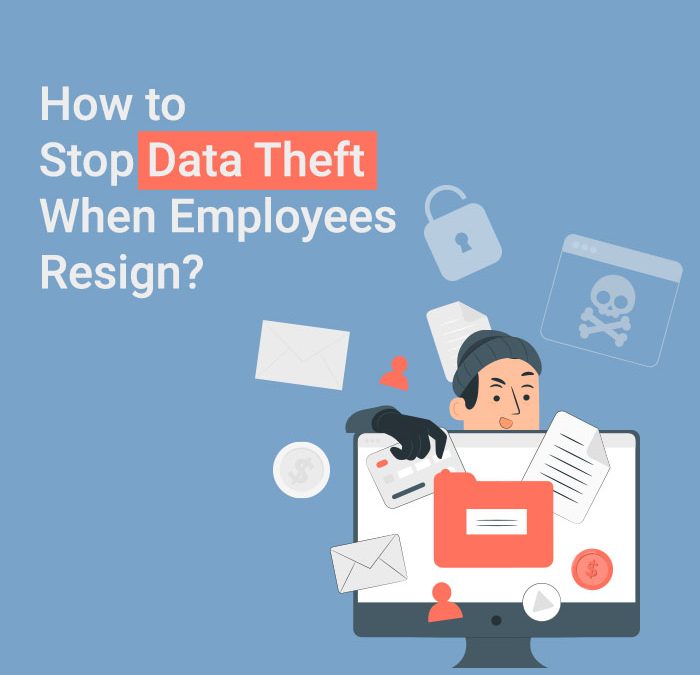
The labor shortage is quite an uprising issue globally. It has encouraged the employees to explore new opportunities and leave their current job. Generally, this phenomenon is called great resignation that has a critical value in this economic world. Companies are worried about managing their employees. It is an additional concern for them because paying them salaries is still the biggest concern.
However, the story does not end in this digital world. Companies also need to be conscious of cybersecurity and data security. When an employee leaves, and you do not delete his account immediately, there may be the chances of data breach and data theft. And if there is a great resignation, the threats can be the worst.
To address this issue, the companies have decided to close their doors of firms for former employees. They must not have any permission to access corporate digital assets once he spends his last day on office premises. "How can businesses manage this task" will be discussed in detail here:
Why can Employee Resignation be a Security Threat?
Off-boarding processes are quite difficult to manage. More interestingly, the human resource executives do not bother it much. Therefore, we can easily observe that many former employees access digital data. It can be very sensitive too. Here, we need to mention that all employees do not leave jobs on good terms. So, there may be the possibility that they start damaging you digitally by stealing important data and using it for illegal or immoral activities.
In this discussion, it is essential to mention that some reports tell about the accessing accounts of former employees. These reports confirm that more than 83% of former employees can still access confidential data. More interestingly, about 56% of employees also confirm that they use this access for damaging their previous company. To deal with this issue, the companies need to control unauthorized access strictly and block all.
Remote Working is a Compounding Risk Factor
Until now, we have discussed only off-boarding. However, the reality is that remote working is also a threat for companies. The reason is that remote workers access their accounts whenever they think so. They are allowed to do so because no fixed timings are there for them. Another crucial aspect is that remote workers do not know much about company culture. All these factors become a reason for cybersecurity issues. With remote workers, you can face the circumstances in case of not dealing with them effectively.
When an organization has both remote and in-house employees, the experts give it the name of the hybrid organization. In a hybrid workforce environment, companies grant permission to all employees to use laptops, smartphones, and other devices and access the company's portal for accessing their task sheets, projects, attendance, and other important data. Here, an uncontrolled security posture can be damaging for the organization. Therefore, the managers must think ahead of their employees due to data protection.
How can Businesses Mitigate Risks Associated with Digitalization and Evolve the Workforce Environment?
Many companies do not take it seriously. Maybe the reason is that managers think they do not have confidential data. Some companies rely more on an internal risk management strategy. They think that this strategy will help them greatly. However, the workforce paradigm and prioritization processes have changed a lot. Therefore, the organizations also need to evolve their strategy with the right approach.
Here, we will discuss how to stop data theft when employees resign to improve data security:
Keep your Organization's Digital Assets on Cloud PCs
Keeping all the data in clouds is a new trend, and many companies have started using this technique because it is secure, fast, and reliable. These cloud PCs cannot be accessed without a username and password. So, no unauthorized individual can enter these systems.
Some organizations also use a digital signature strategy to allow individuals to access this record. However, the issue becomes critical when an employee has left the job but has a username and password on a cloud PC.
If it is so, he can use this system, manipulate the records, and damage your business reputation. He can also affect your sales by sharing customers' details with a new employer or your competitors. To address it effectively, it is essential to remove the account of the leaving employee immediately without waiting for any further notice. In case he comes back, you can create a new account. However, a company cannot compromise on a data breach.
Here, it is necessary to mention that many HR and ITSM systems have a fully automated system to add or remove the employees. Only a few clicks are required to do so. This way, you can improve data security more efficiently.
Adopt a Zero-Trust IT Strategy
Many feel negative about it, but businesses need to take this step immediately, especially in the current world where everything is digital. Before the incorporation of remote employees, it was possible to rely on employees because they were in the office, and managers could keep monitoring them through naked eyes and security cameras.
However, in those scenarios, many companies suffered a lot due to data breaches and data theft.
After involving remote workers, the situation is the worst. Here, the best technique is to adopt a zero-trust IT strategy. The studies have confirmed that less control over company resources can be damaging. Another important aspect of data security is that with the increase of devices attached to the system, the chances of data theft can be increased a lot.
When a company adopts a zero-trust policy, it simply means that there are checks at every level on all systems. Limited access is granted to all employees, and they can access only after providing the required details. Now, device-based access management techniques are not used, and you need to verify your identity to access the system.
When a company implements a zero-trust framework with cloud PCs, it simply means that IT will have control over everything. This way, the companies limit the access of the employees to some specific sections, record every activity, monitor the access of the remote workers, and block unauthorized or unidentified access automatically and immediately.
Remote Work is Permanent
There is no way we can stop hiring remote workers and minimize hiring/firing in the organization. So, we need to learn how to live with these latest trends as a business organization. For that, the companies need to formulate a comprehensive HR and IT system that can keep data protected and secure permanently and unauthorized individuals and systems away.




